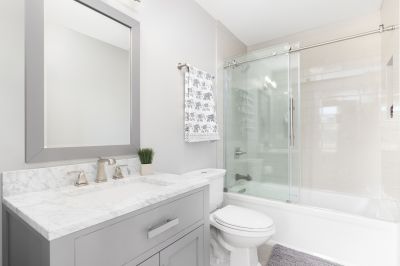Expert Picks For Essential Bathtub Surround Installation Products
Find out which products professionals recommend for a smooth, secure, and visually appealing bathtub surround installation.
 Installing a bathtub surround is a common renovation project that enhances both the functionality and aesthetics of a bathroom. The process involves selecting suitable materials that can withstand moisture and frequent cleaning while providing a seamless, attractive finish. Various products are available to facilitate this installation, ranging from prefabricated panels to customizable tile systems. Proper selection ensures durability, ease of installation, and a cohesive look that complements the overall bathroom design.
Installing a bathtub surround is a common renovation project that enhances both the functionality and aesthetics of a bathroom. The process involves selecting suitable materials that can withstand moisture and frequent cleaning while providing a seamless, attractive finish. Various products are available to facilitate this installation, ranging from prefabricated panels to customizable tile systems. Proper selection ensures durability, ease of installation, and a cohesive look that complements the overall bathroom design.
Top Overall Option
Acrylic Bathtub Surround Panel System
Acrylic panels are a versatile and user-friendly choice for bathtub surrounds. They are lightweight, resistant to moisture, and available in a wide range of colors and textures. These panels typically feature a smooth surface that is easy to clean and maintain, making them suitable for both DIY enthusiasts and professionals. The seamless design often helps prevent water seepage and mold growth, contributing to a healthier bathroom environment. With straightforward installation methods, acrylic surround systems can quickly transform a bathroom while offering a durable, attractive finish.
Types of Products For Bathtub Surround Installations
Acrylic Panels
Lightweight, durable, and available in various finishes, acrylic panels are popular for quick and clean installations.
Fiberglass Surrounds
Affordable and easy to install, fiberglass surrounds are a common choice for budget-conscious projects.
Tile Backer Boards
Waterproof backer boards serve as a base for tile installations, offering customization options.
Ceramic and Porcelain Tiles
Tiles provide a customizable and aesthetic finish, suitable for creating intricate designs.
PVC Wall Panels
PVC panels are waterproof and lightweight, making them suitable for DIY projects.
Solid Surface Panels
Engineered materials that mimic stone, offering a seamless and elegant look.
Stone Veneer Panels
For a natural, upscale appearance, stone veneer panels can be used in surround installations.
Waterproof Wallpaper
Specialized wallpaper designed for bathrooms can add decorative flair when properly sealed.
Epoxy Coatings
Used as a protective layer over surfaces, epoxy coatings help resist moisture and stains.
Modular Wall Panel Systems
Pre-fabricated panels that snap together for quick installation and easy maintenance.
Glass Shower Panels
Clear or frosted glass panels create a modern, open feel for bathtub surrounds.
PVC Foam Boards
Lightweight and waterproof, suitable for custom-cut surrounds.
Composite Panels
Made from a mix of materials for enhanced durability and aesthetic options.
Rubber Wall Panels
Flexible, waterproof, and impact-resistant, ideal for high-moisture areas.
Laminate Wall Panels
Economical and easy to install, with various decorative finishes.
Stone Composite Surfaces
Combining natural stone with resin for a durable, attractive finish.
Popular Choices
A common choice for their ease of installation and variety of styles.
Widely used for affordability and straightforward setup.
Preferred for customization and classic aesthetic appeal.
Popular for their lightweight nature and resistance to moisture.
Essential for tile installations, offering a stable base.
Chosen for their seamless appearance and durability.
Favored for quick assembly and wide design options.
Often selected for modern bathroom designs and open aesthetics.
Popular for DIY projects due to their lightweight and easy-cut features.
Used for adding a natural, textured look to surrounds.
Commonly applied for surface protection and waterproofing.
Chosen for their affordability and decorative options.
Selected for impact resistance and flexibility.
Preferred as a sturdy base for tile installation.
Popular for combining durability with aesthetic versatility.
Used in decorative accents or feature walls within bathrooms.
When choosing products for a bathtub surround, it’s important to consider the material’s resistance to water damage, ease of maintenance, and compatibility with existing fixtures. Some systems are designed for DIY installation, featuring simple-to-follow instructions and lightweight components, while others may require professional help for optimal results. Additionally, the style and color options allow homeowners to personalize their bathrooms, creating a space that reflects their taste and meets practical needs.
Durability is a key factor, especially in environments prone to humidity and splashes. Materials such as acrylic, fiberglass, and certain types of waterproof panels are popular choices due to their longevity and ease of cleaning. For those seeking a more customizable or upscale look, tile-based systems with waterproof backer boards offer flexibility in design but may involve more complex installation steps. Ultimately, the right product selection hinges on balancing budget, aesthetic preferences, and installation requirements to achieve a satisfying and long-lasting bathroom upgrade.
Key Buying Considerations
- Material durability and resistance to water damage
- Ease of installation, especially for DIY projects
- Compatibility with existing bathroom fixtures and design style
- Range of available colors, textures, and finishes
- Maintenance requirements and cleaning ease
- Cost and overall budget suitability
- Seamless versus panel-based options
- Availability of matching accessories and trims
- Flexibility for future modifications or upgrades
- Environmental conditions such as humidity levels
- Warranty or manufacturer support
- Compatibility with waterproofing methods
- Installation time and complexity
- Aesthetic appeal and ability to match decor
- Impact resistance and safety features
